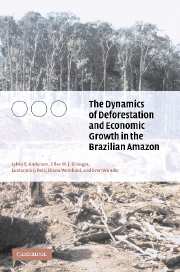Book contents
- Frontmatter
- Contents
- List of figures
- List of tables
- Preface
- List of acronyms and abbreviations
- 1 Introduction
- 2 Development of the Brazilian Amazon
- 3 The municipal database
- 4 The sources and agents of deforestation
- 5 Alternatives to deforestation: extractivism
- 6 Modeling deforestation and development in the Brazilian Amazon
- 7 Carbon emissions
- 8 The costs and benefits of deforestation
- 9 Conclusions and recommendations
- Technical appendix
- References
- Index
5 - Alternatives to deforestation: extractivism
Published online by Cambridge University Press: 22 September 2009
- Frontmatter
- Contents
- List of figures
- List of tables
- Preface
- List of acronyms and abbreviations
- 1 Introduction
- 2 Development of the Brazilian Amazon
- 3 The municipal database
- 4 The sources and agents of deforestation
- 5 Alternatives to deforestation: extractivism
- 6 Modeling deforestation and development in the Brazilian Amazon
- 7 Carbon emissions
- 8 The costs and benefits of deforestation
- 9 Conclusions and recommendations
- Technical appendix
- References
- Index
Summary
Plant extractivism is a sub-sector of agriculture that has received considerable international attention, owing to its alleged potential for promoting the sustainable use of tropical forests and other natural ecosystems, e.g. through the harvesting of non-wood products in extractive reserves. In this chapter we will concentrate on non-wood forest products like nuts, latex, and fruits. Sustainable timber management could in principle provide an important alternative to deforestation, but in practice the link has been the reverse: unsustainable logging enables the process of deforestation. Wood extraction, which was discussed in chapter 4, is thus not included here.
In the writing on the economic history of Brazil, plant extractivism – a production system based on human's removal of biomass from natural ecosystems – has consistently been equated with backwardness. A classical Brazilian historian like Buarque de Holanda sees historical extractivist systems, adapted by the Portuguese colonists from indigenous traditions, as a logical response to a land-abundant physical environment with constrained tropical soils, abundant plagues, and labor scarcity. However, to him it is also a system led by the Iberian conquistador spirit of resource mining and commerce, permitting a harvesting of the fruits of nature without the organized and laborious effort of land cultivation (Buarque de Holanda 1978). On the other hand, the contemporary Gilberto Freyre actually credits the Portuguese for their pioneer efforts to shift from “pure extraction” to agriculture.
- Type
- Chapter
- Information
- Publisher: Cambridge University PressPrint publication year: 2002



